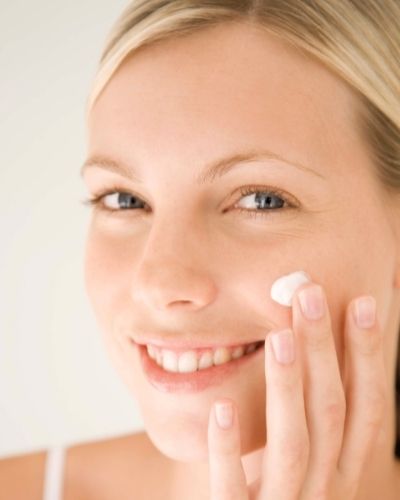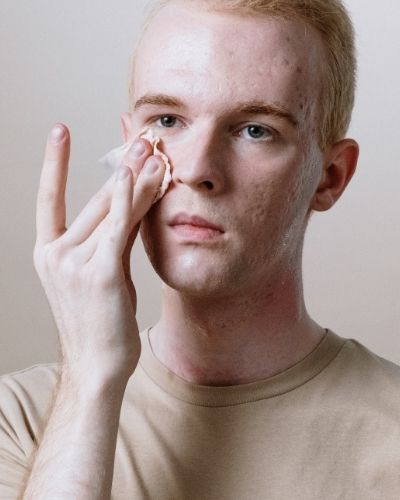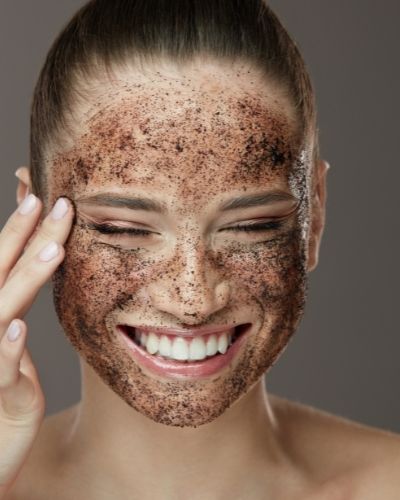Dry skin can become a problem because it simply feels uncomfortable.
This is due to the lack of our natural oil that’s secreted from our sebaceous glands and travels up the pore to sit on the surface of the skin and lubricate it.
When the skin is not lubricated – it dries out and it starts to shed, peel, crack, and even bleed depending on the severity of the dryness.
So the instinctive thing to do is to moisturize it immediately after it starts feeling uncomfortable, right? Well, this will help, however, it’s more like you’re patching things up.
A much better thing to do is to get to the root of the issue so that you don’t have to rely on moisturizers that sometimes don’t get the job done efficiently.
Here are some potential explanations on why is your skin so dry even though you moisturize:
- You’re moisturizing wrong.
- You’re using drying cleansers.
- You’re exfoliating wrong.
- You’re living in a dry and cold climate.
- You’re using prescription medication.

You’re moisturizing wrong

The goal of moisturizing is to create a barrier on the skin to prevent moisture that’s inside the skin from evaporating.
This is also what sebum does, however, when you don’t have enough sebum on the surface – the moisture evaporates from the skin freely with nothing to stop it, essentially leaving the skin dry. So…
Instead of just applying a ton of moisturizers or oils to create a seal, opt for using a humectant first which is a component that attracts moisture into the top layers of the skin, and then seal it with an emollient while your skin is still damp to keep the moisture inside.
Good humectants include hyaluronic acid and glycerin while good emollients triglycerides, squalane, and waxes. When choosing a moisturizer for dry skin, make sure that your moisturizers have these components.
My favorite moisturizers are:
- La Roche Posay – Cicaplast Baume B5
- CeraVe – Daily Moisturizing Lotion (Normal to Dry skin)
- Bioderma – Atoderm Nourishing Face Cream
You’re using drying cleansers

Cleansers are products that can be the most difficult to notice whether they are causing you dryness, especially if you already have dry skin.
For example, oily skin types like myself can easily notice whether a cleanser is too drying if after using it the skin looks shiny and squeaky clean and it just feels tight.
Dry skins, on the other hand, are used to this feeling because this is how the skin feels all the time. So, it can be difficult to figure out whether your cleanser is the one product that’s causing your dryness.
In this case, turn to the texture and ingredients for help. Instead of opting for foaming cleansers – opt for milky emulsions or cream cleansers, and never wash your face with hot water. Use lukewarm or cold water, instead.
On the other hand, avoid cleansers that contain alcohol denat or isopropyl alcohol very high up on the ingredient list as these are notoriously dehydrating to the skin.
My favorite gentle cleansers are:
- La Roche Posay – Toleriane Hydrating Gentle Cleanser
- Vanicream – Gentle Facial Cleanser
- Paula’s Choice – RESIST Hydrating Cleanser
You’re exfoliating wrong

Exfoliation is one of the best things you can do to improve your complexion and get rid of acne, discoloration, post-inflammatory scarring, dullness, uneven skin tone, etc.
The results of exfoliation are pretty obvious. After all, who could look away from that glow? But, doing more exfoliation won’t give you a better glow – it will give you a damaged skin barrier and dry and irritated skin.
Constantly removing the dead skin cells from the surface of the skin can prove detrimental in the long run because this way, you are exposing young and new skin cells that don’t have the same capacity to deal with the external world.
New skin cells also don’t have the same moisture-holding capacity matured skin cells have, therefore, too much exfoliation is one major thing that will leave your skin dry.
But besides exfoliating too often, you may be doing the mistake of exfoliating with products or ingredients that may not be suitable for your skin’s individual needs.
So what do you do in this case?
Well, for one, you need to slow down and give your skin a break from exfoliating. Exfoliate once a week and no more than that until you can notice a change in your skin.
Furthermore, choose products that contain gentle exfoliating ingredients that hydrate the skin and improve its moisture-holding capacity such as lactic acid or a low percentage of another exfoliating acid.
My favorite gentle exfoliators are:
- The Ordinary – Lactic Acid 5%
- Biossance – Squalane + Lactic Acid Night Serum
- Paula’s Choice – RESIST 5% Glycolic Acid Serum
Living in a dry and cold climate

The climate where we are living has a serious impact on our skin. These changes can be dramatic or barely noticeable, but nevertheless, they happen.
I first noticed this when I traveled from my very hot and humid place of living for a holiday in northern Norway.
My skin started feeling dry from the moment I stepped out of the plane, however, it wasn’t until a couple of days later when I started seeing literal flakes coming off from my forehead, cheeks, and around the mouth.
My usual cleanser started burning and leaving my skin excessively dry, so I had to run to the pharmacy for new supplies, even though I arrived there with a small suitcase full of my usual skincare products.
I ended up not using anything throughout the two weeks I was there and had to purchase a new cleanser, moisturizer, and sunscreen to stop my skin from hurting.
This stopped the moment I was back home. My skin immediately turned back to being oily in all areas and I soon got back to using my regular skincare products without any issue.
I personally notice a dramatic change when I visit cold climates, but not every skin reacts like this. However, if your skin is changing throughout the seasons or you happen to live in a cold, dry climate and have dry skin, here are two ways to keep it moisturized:
- keep your environment humid by using a humidifier
- regularly reapply ointments like Vaseline or CeraVe in areas where your skin gets most dry
Using prescription medication

Some prescription medications can dry out your skin and even make it more sensitive to the sun.
The most notorious medication that demands you to have a huge tube of moisturizer and lip balms on you at all times is isotretinoin which is prescribed to patients with severe acne.
Additionally, prolonged use of some other medications not often associated with skin changes like antihistamines, diuretics, and cholesterol medication can have an impact on your skin.
It is always a good idea to do your research on the effects medications can have on your skin, especially if you are prescribed a long-term dosage.

My name is Simone and I am a certified skin specialist. I created this website to teach my readers how to take great care of their skin and I also like to occasionally share my honest opinions on skincare products I’ve tried. You can learn more about me here.
